Europe’s biggest machinery makers
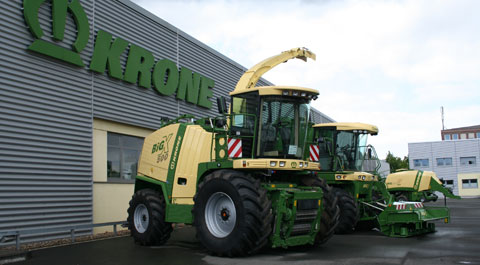
Europe’s leading farm equipment companies are growing in scale as they gain market share and tackle new export markets further afield. Peter Hill profiles the biggest operators in the arable, grassland and livestock sectors
1. DeLaval (Sweden)
2011 turnover: €845m
2004 turnover: €650m
Sweden’s DeLaval is the world’s biggest supplier of milking systems and other equipment and services used on dairy farms.
Almost 50% of revenues (€405m) are generated by conventional and robot milking systems, with parts, cooling technology taking the proportion accounted for by ‘nuts and bolts’ products to 70%.
The business is a division of Tetra Laval, the packaging and bottling group owned by the Swedish Rausing family, which had revenues of €12.1bn in 20112. Kuhn (France)
2011: €832m
2004: €463m
Now comfortably the world’s biggest manufacturer of farm implements by revenues, Kuhn Group has developed a vast range of tillage, spreading, spraying, grassland and feeding equipment, all sold under the one brand.
A number of acquisitions in Europe, Brazil and North America have expanded the range and multiplied revenues; most recent were the Kverneland baler business and factory in The Netherlands for €115m and Krause Corp, a US maker of cultivations equipment and seeders, for around €25m.
Kuhn parent Bucher Industries, a Swiss-based engineering group, spent €6.4m buying a 24% stake in Kuhn’s fertiliser spreader and seed drill maker Rauch last year. Kuhn sales account for more than 40% of Bucher’s €1.9bn turnover from hydraulic components, glass and municipal sweepers.
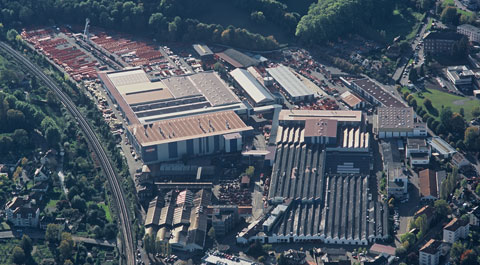
3. GEA Farm Technologies
2011: €509m
2004: n/a*
GEA Farm Technologies supplies milking equipment, cooling technology, automatic feeding systems, animal hygiene, milking parlour cleaning and accessories, barn equipment, slurry technology and farm services. It was created when industrial group GEA acquired milking machine companies Westfalia Separator of Germany and WestfaliaSurge of the USA in 2004, then Canadian manure handling equipment maker Houle in 2007.
It also acquired robot milking technology to complement its conventional systems and in November 2011 added Milfos International, a New Zealand-based manufacturer of milking, cooling, stall and automation products.
Earlier in 2011 the group opened a production facility in China. GEA Group reported €5.4bn turnover in 2011 from sales of equipment and process technology mainly for the food and energy industries.
4. Lely
2011: €500m
2004: €158m
The Netherlands-based international group Lely is firmly focused on the grassland machinery and dairy technology markets.
It is the World leader in robotic milking with more than 15,000 Astronaut systems supplied over the past 20 years, and is now developing a range of automated cattle feeding and cleaning systems.
Lely acquired a German business making farm-scale wind turbine generators in 2012 as it aims to create energy-neutral dairy farming. On the equipment front, Lely acquired Mengele and its trailer and forage wagon products in 2010 and owns 75% of baler maker Welger, which generates sales of around €67m; its North American strategic partner, Vermeer, holds the other 25%.
The group is privately owned by the Lely family.
5. Kverneland
2011: €448m
2004: €503m
The Kverneland Group developed from a plough maker into a major international concern through a series of acquisitions in the 1990s that gave it strong grassland, tillage and spreading/spraying product lines using the Kverneland, Vicon, Taarup and Rau brands.
It also supplies some grassland products to New Holland in North America and to Deutz-Fahr for selected markets.
In 2009, Kverneland agreed a surprise deal to sell its Dutch baler factory and product lines to Kuhn for €115m, realising a net gain of €77m, which reduced borrowings. Revenues dropped from peak of €617m in 2008 to €395m two years later.
By way of recovery, Kverneland acquired a forage wagon range from Veenhuis in 2010 and then negotiated a €4.2m near-40% shareholding and global marketing agreement with baler maker Gallignani of Italy – it has since agreed a 100% take-over of the Gallignani business. Kverneland itself was bought by Kubota Corporation of Japan in 2012 and de-listed from the Oslo stock exchange.
6. Krone
2011: €410m
2004: €172m
Krone’s farm machinery division represents about a third of the €1.2bn sales generated by Krone Group, which manufactures road trailers for articulated lorries and has three farm machinery dealership.
The farm machinery division has focused on grassland products since ditching the arable line of ploughs and power cultivators several years ago and is energetically pursuing the contractor and North American market by developing high performance self-propelled mowers and forage harvesters to complement the smaller equipment.
Krone has a single manufacturing location in Germany where recent investments include a €2.6m shipping complex and €4m training centre. The group is privately owned by the Krone family.

7. Amazone
2011: €395m
2004: €200m
Amazonen-Werke is the biggest European manufacturer specialising in arable equipment – tillage implements, seed drills, fertiliser spreaders and sprayers; it also has a groundscare machinery arm.
Western Europe remains the principal market but sales are growing in Russia and the nations of the Central Independent States (CIS). The company’s 98% turnover growth since 2004 has been achieved almost entirely organically – the most recent acquisition was the 1998 purchase of cultivations equipment manufacturer BBG; the next turnover target is €500m.
Amazone has factories in France (groundscare) and Russia (assembly) and several in Germany, including a €25m green-field complex started four years ago close to the Hude town centre headquarters plant.
8. Exel Industries
2011: €304m
2004: €142m
Created from the Tecnoma sprayer company in France, Exel Industries has brought numerous spray equipment manufacturers into its embrace, including Caruelle, Berthoud and Matrot before the €39m acquisition of Hardi International, together with its Evrard subsidiary, in 2007.
Earlier this year, Agrifac was added to the portfolio for €3m, bringing revenues by around €38m. Like other Exel group businesses it will operate autonomously while capitalising on group buying and distribution opportunities.
Agrifac also adds another sugar beet harvester line to Exel’s Matrot and Moreau products, alongside Herriau precision seeders. Farm equipment accounts for 70% of Exel group sales of €525m in 2011/12; the rest comes from industrial spraying systems.
The Ballu family owns 75% of shares; 25% are listed on the Paris stock exchange.
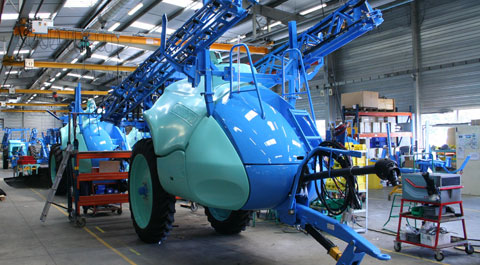
9. Lemken
2011: €282m
2004: €92m
Germany’s Lemken is the second largest arable equipment specialist, with sales developed largely by expanding the range to complement the plough line-up, adding seed drills and, in 2005, by developing a crop sprayer line after acquiring German manufacturers Jacoby and LTS.
It is also energetic in seeking new markets – Russia is now significant and Lemken recently completed a €7m factory in India; it has also begun building a new plant in China while adding a further four production halls to its large headquarters complex in Germany.
The business is privately owned by the Lemken family.
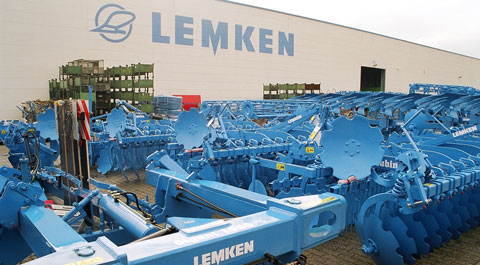
10. Grimme
2011: €270m
2004: €105m
Potatoes are big business for Grimme, which has become the world’s largest potato harvesting machinery manufacturer with a range that now encompasses handling and irrigation equipment, as well as rubber components for potato cleaning and grading systems.
Sugar beet is growing in importance too, with Grimme rescuing financially-troubled Kleine in 2012 to add another line of beet harvesters to its own, together with cleaner-loaders.
Grimme manufactures in Germany and has a US offshoot making potato harvesters for the North American market, which reported sales of €39m last year.
11. Pöttinger
2011: €236m
2004: €127m
Consistent growth in sales of grassland equipment and accelerating success in the tillage equipment sector with cultivators, ploughs and seed drills has helped Pöttinger reinforce its position as Austria’s leading farm equipment business.
The Germany-based drill business was acquired in 2001 havng been run briefly as a joint venture with Rabe; a cultivations equipment plant was set up in the Czech republic in 2007.
These actions have helped shift the reliance on grass equipment, which now accounts for 66% of sales, down from 77% in 2004. In Britain, the Pöttinger family-owned business established its own distribution and service company in 2012.
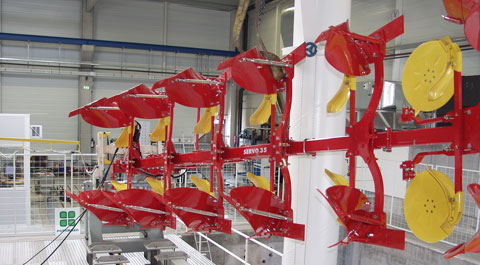
12. Väderstad
2011: €204m*
2004: €92m*
Development of the Rapid seed drill and min-till sowing techniques, together with innovative cultivation implements, has helped transform Sweden’s Väderstad into a major player in the tillage equipment market worldwide.
Huge investment has also transformed the production complex into one of the largest and most modern in its sector, with automated steel raw material handling, robot welding and three-dimensional laser cutting.
New offices and production halls cost €2.2m in 2007; a further €5.8m was spent on new facilities opened in 2011. Väderstad bought a 49% stake in Canadian air drill maker Seed Hawk in 2006 in return for worldwide marketing rights outside North America that has brought products suited to new markets in Russia (where the company now also builds drills and seeders) and other central and eastern European countries. The business is privately owned by the Stark family.
13. Maschio-Gaspardo
2011: €186m
2004: €90m
Italian tillage equipment specialist Maschio bought the precision seeding and grain drill company Gaspardo of Spain in 1994 and merged the businesses in 2007 to create the Maschio-Gaspardo group.
In addition to the Italian and Spanish factories, the group assembles equipment in Russia, makes power tillers in China and tine min-till cultivators in Romania, where €5m was spent on upgrades in 2011.
A €28m factory in India was opened in September 2012 to supply Mahindra & Mahindra with tillers and other implements. The recent acquisition of Italian sprayer companies Finotto and Unigreen and 20% of another spray equipment firm Dal Degan is expected to lift turnover to €250m.
The business is privately owned by the Maschio family.
14. Alö
2010: €175m*
2004: €126m*
Alö of Sweden is easily the world’s biggest manufacturer of tractor loaders, claiming 25% of global sales, 30% in North America and 40% in Europe.
It would be even bigger if a planned take-over of French loader firm MX in 2008 had not be thwarted by an EU competition enquiry.
But it did buy the loader operations of Bush Hog in the US the following year. Main in-house names are Quicke and Trima but OEM contracts add MF and Valtra branding.
Loader manufacture takes place in Sweden and the US but production of attachments moved to China recently at the expense of two Scandinavian factories.
Alo changed hands last year when Scandinavian private equity business Altor paid €240m for the majority stake held by UK investment house 3i.
15. Bauer
2011: €165m
2004: €50m
The Austrian manufacturer of crop irrigation and slurry treatment and pumping systems has grown significantly in recent years, largely organically but also through acquisitions including German screw pump and slurry tanker maker BSA, bought from DeLaval in 2007; another tanker maker Eckart; and FAN Separator, the German manufacturer of agricultural and industrial screw separators.
More than 60% of sales are still generated by the core Bauer operation, which is privately owned by senior managers and other investors.
16. Horsch
2011: €165m
2004: €49m
Horsch is one of the fastest-growing farm equipment businesses of recent years and is now a leading player in the tillage sector with its cultivation tools and seed drills, initially focused on mintill and big acreage farms but now catering for a broader mix of farm sizes and establishment techniques.
The company built a €15.6m second factory complex for start-up in 2007 and has since expanded the headquarters site with a €10m parts logistics centre, with a new R&D centre being completed next door.
Horsch also assembles large-capacity drills and cultivators in Russia and joined forces with a US air drill manufacturer 12 years ago to form Horsch Anderson in South Dakota.
In 2011, the company returned to the crop spraying sector with Horsch Leeb Application Systems. The Horsch family owns the business.
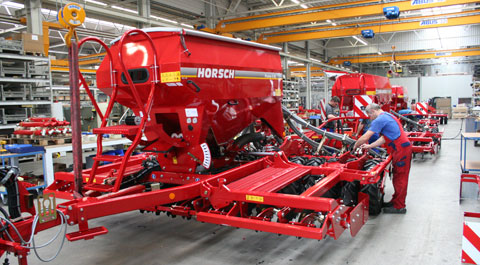
17. Alamo Group Europe
2011: €131m*
2004: €67m*
This subsidiary of Texas-based Alamo Group was created with the acquisition of vegetation control specialist McConnel in 1991, then Bomford Turner two years later.
Twose and Spearhead and several French manufacturers followed in succession, including Rousseau and loader maker Faucheux.
UK sales account for a quarter of revenues, two-thirds are from France; the group as a whole accounted for a third of the parent company’s €470m sales in 2011.
18. Kongskilde Industries
2011: €120m*
2004: €98m*
Kongskilde Industries of Denmark now has a grass and feed wagon division following the acquisition of fellow Danish business JF-Stoll and its €40m turnover last year.
They join equipment for bulk storage and handling of grain and industrial products, and the arable tillage line.
The latter was developed by acquiring Overum, Nordsten, Tive and Howard between 1997 and 2001. Buying Illinois-based Progressive Farm Products in 2011 has bolstered the North American tillage range.
In Europe, Kongskilde recently completed a €122m rebuild of its Polish factory (half paid for by EU Structural Funds) to provide modern facilities for manufacturing Kongskilde cultivators, Nordsten seed drills and Howard power harrows.
Equipment sales reached a peak of €124m in 2008. The group’s 2011 turnover doubles to €240m when the Vitfoss feed minerals business is included; this was transferred in 2010 from the company’s parent since 2007: DLG is Denmark’s largest farmer-owned co-operative with €5.6bn turnover in 2011.
Note: Euro values for Alamo Europe converted from Sterling; for Alö and Väderstad from Swedish crowns and for Kongskilde from Danish crowns; GEA – no comparable figure available for 2004 when GEA’s farm equipment activities were part of an industrial division. Kongskilde 2011 figures includes four months contribution from JF-Stoll with recent annual revenues of €40m, down from around €100m in 2004.
A couple of familiar names are heading towards the arbitrary €100m turnover cut-off point for this article, including the Belgian company Joskin, which manufactures slurry tankers and trailers with sales worth €91m in 2011 and forecast to reach €107m in 2012.
Revenues at Gregoire-Besson of France should be up from €60m to around €90m this year following its acquisition of German plough and cultivator maker Rabe, while Italy’s Tonutti Wolagri Group should also have advanced on the €75m turnover reported for 2008 from sales of grass equipment and seed drills.
Strautmann, the German forage wagon specialist, recorded €69m revenues in its 2011/12 financial year to the end of July, while Sulky-Burel, the French maker of fertiliser spreaders, cultivators and drills, has a bit further to go having done €42m-worth of business this year.
After the Alamo Group Europe combination of agri implement and vegetation control companies, dairy specialist R J Fullwood & Bland is Britain’s next biggest farm equipment business with revenues equivalent to €88m last year, down from a peak of €94m in 2008.
The Fullwood Packo group comprises milking systems manufacturer Fullwood, and Netherlands-based Packo companies producing dairy electronics and industrial products, plus a number of distribution businesses. In 2011, milking equipment accounted for 55% of turnover, milk cooling tanks 24%.
Next up is IAE, the Staffs-based maker of fixed equipment, feeders and weighing systems for livestock farms, with 2011 sales that recovered close to the €53m peak recorded in 2008.
Among field equipment manufacturers, Simba International’s sales figures dropped to the equivalent of €20m last year after losing Horsch distribution in light of Simba’s acquisition the year before by America’s Great Plains Manufacturing. New products and increased export sales, which increased to 38% of revenues last year, should see turnover climbing back to the 2008 high-point of €35.5m.
In the grassland/livestock sector, Teagle Machinery’s near-€15m equivalent turnover leads the way.
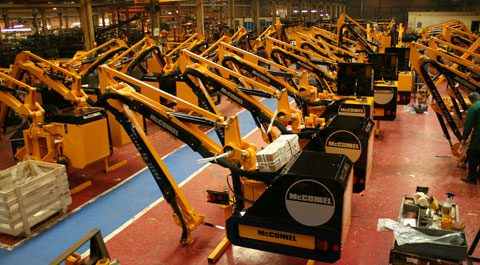
Manufacturers and their suppliers have been through the mill managing a rollercoaster ride as demand rose and fell in quick succession during the past six years.
First, demand soared to a peak in 2008 as a positive investment mood amongst farmers in western markets coincided with accelerating demand in Russia and other new markets of central and eastern Europe, such as Poland and Hungary.
Then the world financial crisis caught up with agriculture; farmers in the west became more cautious, credit in central and eastern European states evaporated and machinery sales fell off a cliff.
Recovery has come quickly, though with manufacturers already reporting record sales beyond the 2008 peak.

